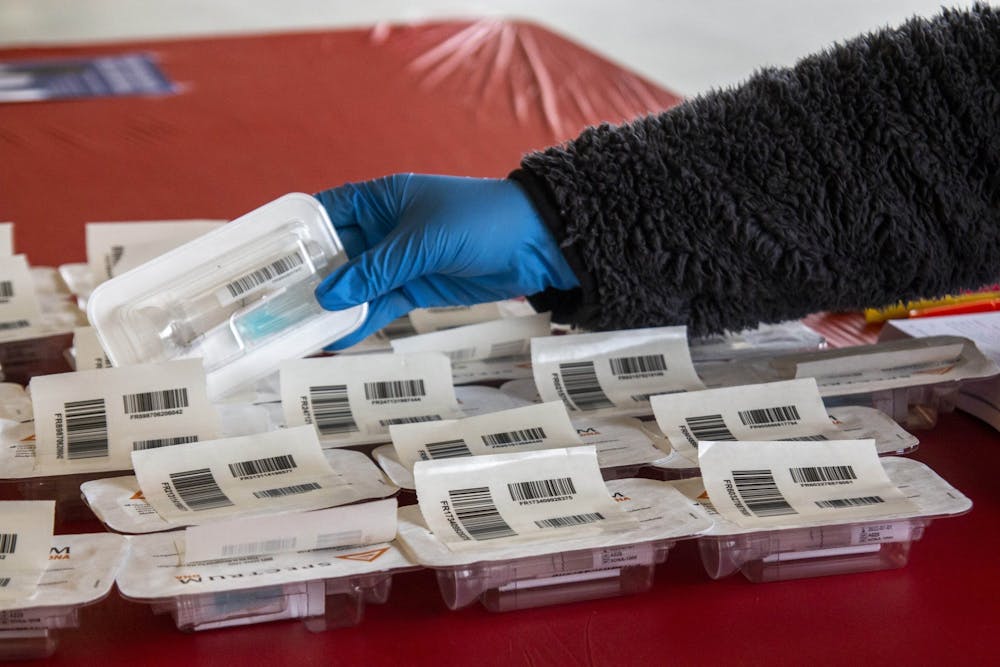The nursing student walks to the COVID-positive patient's room in the postpartum unit. As part of his mandatory 20 to 30 hours of clinical time a week, John Wells dresses to protocol in personal protection equipment, a mask and face shield.
Taking inspiration from the wartime stories of Red Cross founder Clara Barton, Wells never hesitates before opening the door.
But his wardrobe blocks more than the virus — it also obstructs personal connection. His eyes are the only link between him and the patient.
“It kinda makes you feel like you're an alien in their room,” Wells, a student in IU’s accelerated nursing program, said. “You want them to see you and feel that you are there for them, and it's hard to do when you look like this.”
Wells began the two-year nursing track in the middle of the COVID-19 pandemic, yet it never hampered his or his classmates' desire to go into the field, Wells said. Nor has it seemed to have slowed enrollment. Fall 2021 saw the highest enrollment in the IU School of Nursing, even compared to before the pandemic, according to enrollment data from the Office of the Registrar.
Related: [‘You need to let go of control’: Perspectives from the pandemic]
IU and other eligible associate degree registered nursing programs are now allowed to increase enrollment at any rate deemed appropriate by the program due to House Bill 1003, signed into law by Indiana governor Eric Holcomb last month. The bill seeks to ease Indiana’s nursing shortage with a variety of changes to existing rules, such as allowing nursing programs to substitute a certain number of simulation hours for clinical hours.
Although it hasn't dampened desire, COVID-19 left a mark on how nursing students are preparing for the profession, from class conversations about infectious diseases and community health to the kinds of patients they see during clinical hours.
“Most of us have spent the last two years trying to take care of patients who had something else going on because we have spent so much time taking care of COVID patients that we don't necessarily even know what some of the other things look like in clinical practice,” IU senior and nursing student Nicole Milne said.
For example, a common patient pre-pandemic would have been someone with diabetic ketoacidosis, but she’s only taken care of one or two patients like that in the past two years, Milne said.
However, Milne states that in terms of hard skills – placing IVs, inserting catheters or nasogastric tubes and other hands-on skills – they are just as prepared as any previous or subsequent nursing class. As COVID-19 hospitalizations continue to decline, she is hopeful that a different, more normal kind of nursing will return.
“And we’ll just have to learn some of those norms on the job,” Milne said.
While students are not getting the traditional nursing school experience, IU nursing professor Gregory Charter said students are learning tough, valuable nursing and life skills early on due to the pandemic.
“The students are probably coming out stronger because they’ve lived through this experience,” Charter said. “We are dealing with stigma, we are dealing with bias, we are dealing with all these things in a pressure cooker, and the students are on the front lines of that. I don’t think there’s any better learning than that.”
There are many difficulties facing nursing students as they look to join the field, including wage growth for health care workers falling behind other industries and continuing worker shortages. Registered nurses had the first or second largest number of open job postings throughout Indiana’s 11 economic growth regions during the fourth quarter of 2021, according to the Indiana Department of Workforce Development. These workplace factors are concerning for soon-to-be nursing graduates.
“Something that I actually feel really worried about is the loss of practical knowledge and experience with so many older or middle-aged nurses leaving nursing,” Milne said. “On-the-job learning is best facilitated by a nurse who has been doing that job for 10, 15, 20 years. But I think there’s a lot of them who have left – that potential loss of an older generation’s knowledge and ability to train us up or mentor us.”
Before nursing school, Derek Gorza was working as a medical scribe in Waco, Texas, when the area’s first COVID-positive patient walked into the emergency department. Now preparing to graduate from nursing school, his concerns are summed up in one word:
“Exploitation,” Gorza said. “I am concerned that I am going to be overworked and underpaid, and that's all too common in society today.”
Despite concerns about the future, each of these nursing students remain adamant they never questioned their decision to pursue nursing, even if COVID-19 cases resurge.






